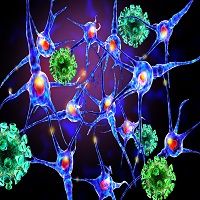Article
MS Patients Improve with Stem Cell Transplants
Author(s):
Autologous human stem cell transplantation can apparently reset the immune systems of patients with relapsing remitting MS (RRMS) and lead to improvements in their degree of disability, according to a JAMA study. Richard Burt MD and colleagues looked at 123 patients with RRMS and 28 with secondary progressive MS, 85 of whom were women.All were treated at Northwestern University in Chicago, IL with peripheral blood stem cells between 2003 and 2014 and followed for 5 years.The authors also said that 80% of patients were relapse-free at the 4-yr point.

Autologous human stem cell transplantation can apparently reset the immune systems of patients with relapsing remitting MS (RRMS) and lead to improvements in their degree of disability, according to a JAMA study.
Richard Burt MD and colleagues looked at 123 patients with RRMS and 28 with secondary progressive MS, 85 of whom were women.
All were treated at Northwestern University in Chicago, IL with peripheral blood stem cells between 2003 and 2014 and followed for 5 years.
The authors say there was significant improvement in disability and that 80% of patients relapse-free at the 4-yr point.
Total quality of life scores also improved and T2 lesions volume decreased.
Before treatment most of the patients had had relapses, with 39.3% reporting 2 such incidents and only 21.4 % saying they had not had a relapse. None of the subjects died as a result of treatment, though one succumbed to cardiovascular disease.
Though drug treatment has been shown to halt or lessen relapses the best news in the study was the degree to which patients’ Extended Disability Status Scale (EDSS) scores improved, the authors said.
“No previous study, to our knowledge, has demonstrated a decrease in EDSS score by 0.5 or more (an improvement) , a 1.0 decrease in EDSS score (improvement) in the treated patients as shown herein and if substantiated in other studies, may set a benchmark for MS research based on reversal of disability,” they wrote.
Myeloablative transplant regimens, another MS therapy, causes irreversible bone marrow failure, which the stem cell therapy does not, the team wrote.
Full analysis of the therapy’s potential to help MS patients requires a randomized trial, the authors said. But they believe their observational study lays the groundwork for that.
“Among patients with relapsing-remitting MS, nonmyeloablative HSCT was associated with improvement in neurological disability and other clinical outcomes,” they concluded.
In an accompanying editorial, Stephen Hauser, MD agreed that the therapy might be helpful but raised several questions. “Given the availability of highly effective FDA-approved therapies against relapsing-remitting MS, it would seem reasonable to use these proven monotherapies in the clinical setting before considering complex HSCT regimens,” Hauser wrote.
He also said longer time periods would better show whether the therapy really works and to “increase confidence that these therapies have not caused undue harm.”




